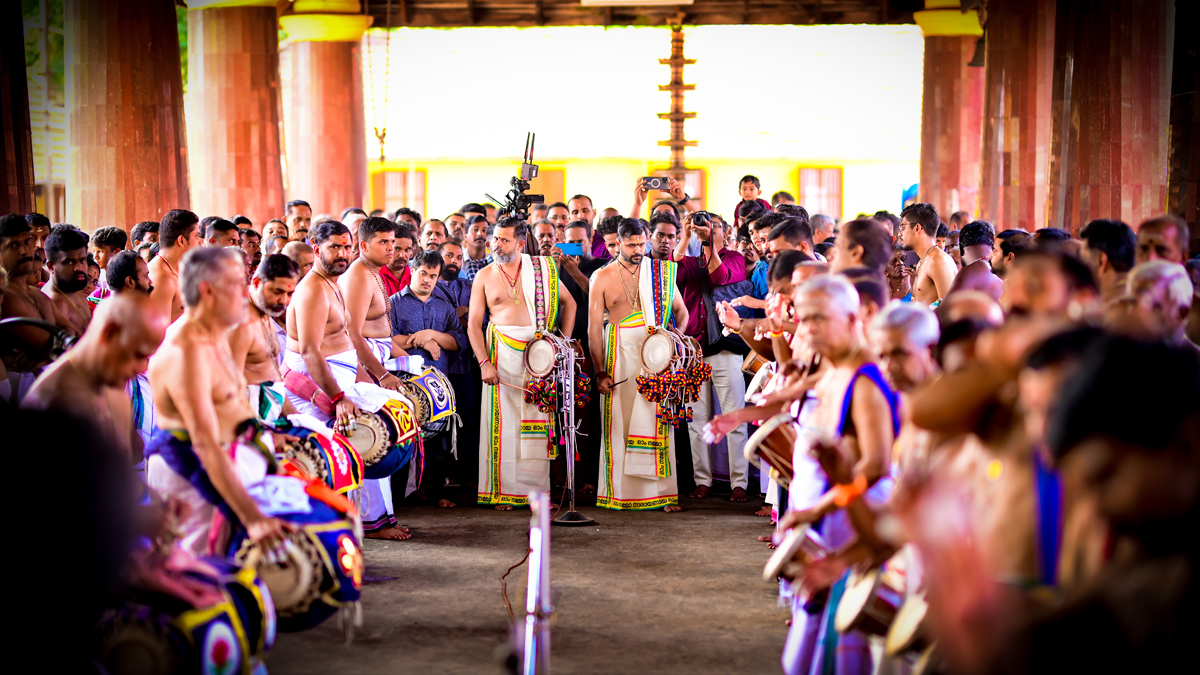As the stick strikes the off-white membrane across the drum head, the hourglass-shaped body reverberates, creating a distinct high-pitched sound. Meet “edakka”, a handy percussion instrument that is a regular fixture in certain temples in Kerala, hung at its designated space when not in use.
THE WEEK spoke to Vineesh Kammath, renowned percussionist known for his expertise with edakka through years of temple performances. And now, he is on a mission to preserve traditional arts by finding them their niche spaces at global events.
“Edakka is a holy instrument; it should always be kept between heaven and earth, and it should never be kept on the ground,” said Kammath. “In between” translates to “idakk” in Malayalam, and It is believed that it gets its unique name—edakka—due to this, according to Kammath, a disciple of veteran artiste Dr. Maruthorvattom Unnikrishnan. Other sources say that it may be due to the “dakk” sound it produces. Edakka is a unique instrument that can be played as a lead as well as an accompaniment.
Kammath set up Kriti Entertainments in 2018 with an aim to blend classical art forms with contemporary appeal through its performances. They headlined the recently concluded Kerala Travel Mart 2024 with the act called “Tha Thom: The Vibrant Colours of Jugalbandi” on its opening day.
Spreading the temple crafts as a service
Growing up surrounded by the vibrant temple culture in Kerala, Vineesh stresses on the deep reverence instilled in him for the spiritual significance of percussion. Kerala temple festivals are known for the flamboyant use of drums that form the combo of Panchavadyam, which feature five instruments—chenda, kuzhal, edakka, elathalam, and timila.
ALSO READ | The AI Smith dinner proves Trump has lost the humour war
Edakka and timila find their regular places inside the temple walls as well, with the former being lauded as a humble instrument that evokes a spiritual and emotional connect with listeners. Edakka, along with the handy metallic gong called “chengila” accompaniy the vocals in “sopanasangeetham”—a temple art form typically sung by the side of the holy steps (sopanam) that lead to the sanctum sanctorum of a shrine.
“As a devout follower, I feel it is my duty to be of service… to preserve these ‘chittakal’ (traditions) while taking the art form to more people across the world,” Kammath explained.
Thuravoor brothers and BBC fame
Vineesh Kammath, along with his brother Thuravoor Rakesh Kammath—edakka performer and sopanasangeetham maestro—are known as Thuravoor Brothers. In 2019, the duo performed sopanasangeetham for BBC World’s Rhythm of India series. The performance was shot at the famed Narasimha Murthy Temple in Thuravoor in the Alappuzha district of Kerala.
ALSO READ | How an exhibit on lost saris of west Deccan takes us back to stories untold or forgotten
Also read
- Kerala bypolls: BJP's young software engineer to take on Priyanka Gandhi in Wayanad; no Sobha Surendran in Palakkad
- Expelled Congress leader P. Sarin all set for his new political journey with CPI(M) backing
- Kannur ADM death: CPI(M) shows 'yellow card' to P.P. Divya in Naveen Babu case
- Kerala: Sarin lashes out at Oppn leader Satheeshan after ouster from Congress
“With authentic performances, we want to be global ambassadors for Kerala’s cultural legacy. It can be done by collaborating with international platforms, festivals, and cultural institutions. This will inspire greater awareness and appreciation for our state’s music, dance, and folklore,” he added.
Foreign tourists get a taste of rich temple arts
Kerala Travel Mart 2024 featured a new record of 2,839 takers from 76 countries, including 808 foreign delegates, according to data published by the Department of Tourism, Government of Kerala. The latest edition featured over 75,000 B2B meetings, aimed at promoting sustainable ease-of-trade.
It was at the opening of this event that Kammath’s Kriti Entertainments set up the “Tha Thom” musical act, featuring temple instruments such as Edakka. With the right stage set for showcasing arts to business owners and beneficiaries, Kammath aims to scale up his efforts to promote local talent and music across global boundaries.
“Kalamezhuthupaattu, mudiyettu, and other ‘kshethrakalakal’ (temple arts) need more exposure. It helps us preserve them without losing their cultural significance and give them historic importance,” Kammath told THE WEEK. The musical maestro expects more invitations in the near future from venues and events to showcase the culture and tradition of Kerala.


